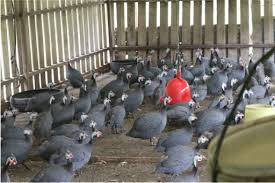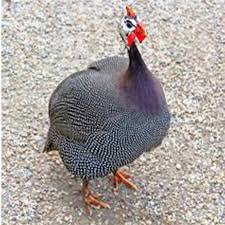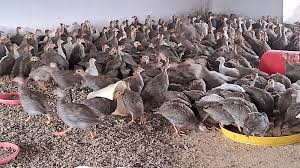![]()
If you’ve landed on this article page, you’re probably searching for a
good business idea—an idea that’s light on the pocket but heavy on
returns, promising both a fulfilling journey and potential profit.
|
How
to start a lucrative Guinea Fowl farming in Nigeria
Guinea fowls, also known as guineas or pintades, are preferred
due to their adaptability and hardiness, making them a valuable
addition to poultry farming in Nigeria. They have high disease
resistance and thrive under diverse environmental conditions.
Guinea fowls not only provide meat and eggs but also contribute
to pest control on farms. Guinea fowl farming is fun and
profitable at the same time if you can manage everything
perfectly. Guineas are not among the highly egg productive
poultry birds. They will lay around 100 eggs per year.
It takes a minimum of 28 days for the eggs to hatch – that is
their incubation period of the eggs; each egg weighs 40-45
grams. Just like chickens, the guinea fowl also take between 16
and 20 weeks to mature.
Their feeds may not be a huge burden on the farmer because they
can feed even on vegetation and grains and without commercial
feeds, they will always flourish.
Housing and Equipment: Providing adequate shelter and facilities
for the guinea fowls is essential for their well-being and
productivity. Also, procuring required equipment such as
feeders, waterers, and incubators facilitates efficient farm
management.
Acquire Guinea Fowls: Healthy guinea fowls must be obtained from
reputable breeders. This forms the foundation of the farm as it
ensures desirable traits and genetic diversity.
Breeding and Reproduction: Managing breeding pairs carefully and
providing optimal nesting spaces supports successful hatching
and chick rearing.
. Health Management and Hygiene: Implementing preventive
healthcare measures, including vaccination and regular health
monitoring, minimizes disease risks and ensures the overall
well-being of the guinea fowls.
Guinea Fowl Farming presents a huge opportunity for Nigerians
who desire to go into agriculture. With careful planning, proper
management, and a focus on quality, guinea fowl farming can be a
profitable venture, contributing to food security and economic
development in Nigeria.
In the wild, guineafowl mate in pairs. This tendency also exists
among domesticated guineas if there are equal numbers of males
and females. As the breeding season approaches, pairs of guineas
will wander off in search of nesting sites. It is not necessary,
however, to have equal numbers of females and males to obtain
fertile eggs.
“For most flocks, one male is usually kept for every four to
five females. When guineas are kept in close confinement, one
male may be mated with six to eight females.
“Guineas usually start laying in March or April and may continue
to lay until October. A hen from a carefully managed flock may
lay 100 or more eggs a year. Breeders generally produce well for
two or three years. They can be kept for four to five years in
small farm flocks. In such flocks, hens usually lay about 30
eggs and then go broody.
“The incubation period for guinea eggs is 26 to 28 days, similar
to the incubation period for turkeys. If available, broody
chickens can be used to hatch guinea eggs.
“Typical bantam chicken hens can sit on 12 to 15 guinea eggs,
while a large chicken hen can sit on 20 to 28 guinea eggs.
Guinea hens do not always make good mothers. Chicken hens tend
to be much better mothers, and a large chicken can brood up to
25 guinea keets.”
You can either do it small scale or commercially. If you want to
do them commercially, they are economical, they are in demand,
easy to manage and less vulnerable to diseases. Guineafowls can
also be kept to scare away predators; they can feed on small
predators like insects and ticks, and they can also fight
against snakes or mice and also rats.
Some of the benefits of guinea fowl include its adaptability to
diverse climatic conditions and suitability for back-yard
rearing. It consumes various non-conventional feedstuffs and is
tolerant to most poultry diseases. It yields high protein and
low fat carcass unlike the chicken.
Guineas generally much prefer to roam freely, although they can
be kept confined. The more space you have to allow your birds to
roam, the happier they will be.
In most cases, the guineas are not as tame as the chickens and
they are hard to catch if you let them roam.
The guineas are excellent flyers, and they are able to fly at a
very early age. They are able to fly up to 400-500 feet at a
time.
After setting the house or shelter, consider purchasing high
quality birds from local breeders, online sellers or feed
stores.
You can either buy adult or keets. But it will be much easier to
tame the birds if you can raise them from keets.
Purchasing healthy and high quality keets is the key to success
in guinea fowl farming business.
guinea fowl, about guinea fowl, guinea fowl farming, guinea fowl
farms, guinea fowl farming business, guinea fowl farming guide,
guinea fowl farming facts, commercial guinea fowl farming
The guineas are available in a variety of ‘pure-bred’ colors.
But many of the birds are cross-bred, resulting in multicolored
feathers.
Feather color of these birds is the only difference between the
different varieties. The guineas are monogamous creatures,
purchasing them in pairs is best.
Identifying male and and female birds is very difficult, but not
impossible. You can identify male and female if you look for
these things.
They can also be raised for both meat and egg production. Their
eggs can be eaten just like chicken eggs. Meat of the young
birds is tender and tastes like that of wild game birds.
After setting the house or shelter, consider purchasing high
quality birds from local breeders, online sellers or feed
stores. You can either buy adult or keets. But it will be much
easier to tame the birds if you can raise them from keets.
Purchasing healthy and high quality keets is the key to success
in guinea fowl farming business. The guineas are available in a
variety of ‘pure-bred’ colors. But many of the birds are
cross-bred, resulting in multicolored feathers.
Feather color of these birds is the only difference between the
different varieties. The guineas are monogamous creatures,
purchasing them in pairs is best. Identifying male and and
female birds is very difficult, but not impossible. You can
identify male and female if you look for these things.
The males generally have larger wattles than the females.
The females generally make a two-syllable sound, while the males
make a single-syllable sound.
The males have a narrower opening between their pelvic bones
than the females.
If you hold the guinea under one arm and use your free hand to
feel the bones, you should notice a distance of about two
fingers on males and three fingers on females.
After purchasing the birds, it is best to keep them confined for
a week or two to let them become accustomed to their new home.
They could run away, if you let them out right away. It is good
to confine them in a pen where they can see the area where they
will be living. Let one bird out after the initial couple of
weeks.
As the guineas hate to be alone, so the single bird will not go
far and will learn it’s way around the area. Let a second guinea
out after a few days to round with the first. It is generally
safe to let the rest out, if they stay near the pen.
Get our Practical Training guide on Guinea Fowl Farming Business
in Nigeria. This guide will provide a detailed roadmap on how to
start a Guinea Fowl Farming, , from market research to
operational strategies, ensuring you have all the information
needed to succeed in the
Business in
Nigeria.
|







